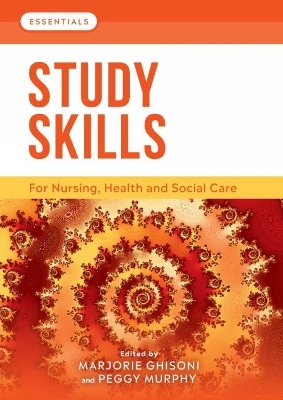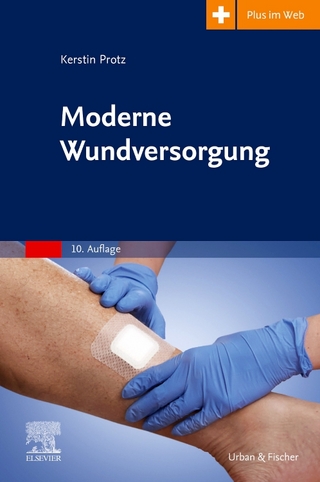
Study Skills
Lantern Publishing Ltd (Verlag)
978-1-908625-65-6 (ISBN)
Study Skills is an introductory book for all health and social care students which will help them develop their study skills, enhance their employability and become resilient lifelong learners.
An accessible textbook to help students develop their study skills.
Study Skills is an accessible textbook for nursing, health and social care students seeking to improve their study skills, develop their resilience, enhance their employability and cultivate a love of lifelong learning.
Through clear explanations, helpful hints, activities and quizzes, the book will help you to develop your study skills for both your studies and future career. You will learn:
How to manage your time
How to develop your reading and note-taking skills
How to search the literature and apply critical thinking to your reading
How to write essays and reference your sources
How to use feedback and reflective practice to improve your academic performance
How to deliver effective presentations
This book will help you to develop your study skills and become a resilient lifelong learner.
Essentials is a series of accessible, introductory textbooks for students in nursing, health and social care. New and forthcoming titles in the series:
The Care Process
Communication Skills
Leadership
Mental Health
Promoting Health and Wellbeing
Study Skills
Marjorie Ghisoni is a Lecturer and course lead for mental health nursing at Bangor University in North Wales. Marjorie qualified as a nurse in 1996 with Bangor University and worked as a community psychiatric nurse for a few years before becoming a lecturer practitioner part-time, then a full-time lecturer in 2003. After gaining her PhD in 2012, Marjorie believes that compassionate understanding of the needs of people in all walks of life is the main component of healthcare skills, education, development and practice. Peggy Murphy is a Senior Lecturer in adult nursing at Liverpool John Moores University. She has nursing experience in acute medicine and cardiothoracic intensive care and has worked as a registered nurse both in the UK and Australia. She became a nurse lecturer in 2003 and developed an interest in working with students as partners to enhance inclusive practice in nurse education. Peggy was awarded a National Teaching Fellowship by the Higher Education Academy in 2014 for her collaborative work on assessment and feedback. Peggy has published and co-presented her work with students nationally and internationally. She currently acts as a co-convenor for the Researching, Advancing and Inspiring Student Engagement (RAISE) Special Interest Group on partnerships.
About the authors; Introduction
1. Skills for the resilient learner
Peggy Murphy and Marjorie Ghisoni
1.1 Introduction
1.2 Five ways (5rs) to develop resilience for health and wellbeing
1.3 Developing resilience in everyday life
1.4 Developing resilience for lifelong learning
1.5 Developing resilience for employability
1.6 Conclusion
2. Effective time management
Peggy Murphy
2.1 Introduction
2.2 Strategies to combat time-wasters
2.3 Suggested study toolkit
2.4 Conclusion
3. Reading and note-taking skills
Marjorie Ghisoni
3.1 Finding the right information
3.2 Making concise notes
3.3 Writing a literature review
3.4 Conclusion
4. Skills for literature searching
Seren Roberts
4.1 Introduction
4.2 Starting your literature search
4.3 What is literature?
4.4 Developing a systematic approach to literature reviewing
4.5 Conclusion
5. Skills for critical thinking
Tracy Ross
5.1 Introduction
5.2 What is critical thinking?
5.3 How to think critically: a six-stage process
5.4 How does critical thinking improve resilience?
5.5 How does critical thinking improve employability?
5.6 Conclusion
6. Writing essays and reports
Marjorie Ghisoni
6.1 Introduction
6.2 Begin at the beginning
6.3 Make a plan
6.4 Referencing from journals and books
6.5 Organising and composing your work
6.6 Engineering your work and writing reports
6.7 Spelling and structure
6.8 Conclusion
7. Referencing skills
Helen Thomas, Jacqui Maung, Ella Turner and Paul Verlander
7.1 Referencing and academic integrity
7.2 Plagiarism
7.3 Developing a rigorous approach to referencing
7.4 Referencing
7.5 Conclusion
8. Feedback
Peggy Murphy and Craig Morley
8.1 Introduction
8.2 The purpose of feedback
8.3 Feedback mindset
8.4 Feed-forward
8.5 Action-planning
8.6 Marking rubrics
8.7 What to do after you receive feedback
8.8 Conclusion
9. Reflective writing skills
Marjorie Ghisoni
9.1 Introduction
9.2 Models of reflective practice
9.3 Should we follow our gut instinct?
9.4 Keeping a reflective journal
9.5 Developing reflective resilience in our everyday practice
9.6 Reflective writing, self-compassion and student resilience
9.7 Reflective writing and lifelong learning
9.8 Professional requirements for reflective practice and lifelong learning
9.9 Reflective writing for employability
9.10 Conclusion
10. Skills for teamworking
Liz Lefroy
10.1 Introduction
10.2 What is a team?
10.3 Teamwork in time of change
10.4 Team role theory
10.5 The development of groups and teams
10.6 Communication and sustainable teamwork
10.7 Dealing with conflict
10.8 Resilience
10.9 Conclusion
11. Skills for presentations and public speaking
Paul Jeorrett
11.1 Introduction
11.2 The 3 Ps: preparation, planning, practice
11.3 Delivering the presentation
11.4 Conclusion
12. Skills for employability in health and social care
Marjorie Ghisoni
12.1 Introduction
12.2 Developing employability skills using your lifelong learning skills
12.3 Key lifelong learning skills for employability
12.4 Employability skills and professional practice
12.5 Developing resilience skills to improve your employability
12.6 Developing transferable skills for employability
12.7 Conclusion
13. Skills for the developing professional
Marjorie Ghisoni
13.1 Introduction
13.2 Developing resilience as a professional
13.3 Developing employability skills in professional practice
13.4 Developing lifelong learning skills as a professional
13.4 Conclusion
14. Lifelong learning skills: future-proof your learning
Peggy Murphy
14.1 What is lifelong learning?
14.2 Where does resilience fit into LLL?
14.3 Employability and lifelong learning skills
14.4 Future-proofing learning to maintain professional standards
14.5 Future-proofing learning to maintain professional registration
14.6 Combining reflective practice with a growth mindset
14.7 Conclusion
Answers to chapter quizzes; Index
| Erscheinungsdatum | 10.05.2021 |
|---|---|
| Reihe/Serie | Essentials |
| Verlagsort | Cheltenham |
| Sprache | englisch |
| Maße | 172 x 244 mm |
| Gewicht | 437 g |
| Themenwelt | Medizin / Pharmazie ► Pflege ► Ausbildung / Prüfung |
| ISBN-10 | 1-908625-65-1 / 1908625651 |
| ISBN-13 | 978-1-908625-65-6 / 9781908625656 |
| Zustand | Neuware |
| Haben Sie eine Frage zum Produkt? |
aus dem Bereich


